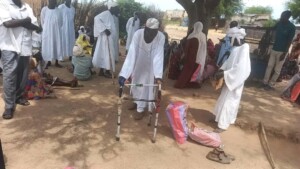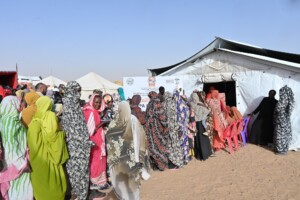Saudi Arabia set to invest $3 bn in Sudan
Saudi Arabia have pledged $3 bn in a joint investment fund for Sudan during a meeting between the Saudi Crown Prince and Prime Minister, Mohamed Bin Salman, and Chairman of the Sovereignty Council, Lt Gen Abdelfattah El Burhan, at the COP27 Middle East Green Initiative on Monday.
 Chairman of the Sovereignty Council, Lt Gen Abdelfattah El Burhan address last year (File Photo: SUNA)
Chairman of the Sovereignty Council, Lt Gen Abdelfattah El Burhan address last year (File Photo: SUNA)
Saudi Arabia have pledged $3 bn in a joint investment fund for Sudan during a meeting between the Saudi Crown Prince and Prime Minister, Mohamed Bin Salman, and Chairman of the Sovereignty Council, Lt Gen Abdelfattah El Burhan, at the COP27 Middle East Green Initiative on Monday.
In an interview with Radio Dabanga, economist Khalid El Tijani, considered the $3 bn Saudi Investment Fund injection as nothing more than economic enterprise on their behalf.
He explained that the Saudi Investment Fund is a profit-making institution, therefore these projects depend on the “specific country being encouraging and attractive enough” to investors.
El Tijani added that this requires that Sudan be able to present convincing projects to Saudi investors, and it is likely that the “amount allocated by the Saudi Fund will not be given all at once”.
Lost funding
Political economist Abdelrahman Eisa also said that El Burhan's coup on October 25, 2021, caused "the closure of the international finance windows that opened to Sudan after the 2018 December revolution".
The October 25 military coup last year moved international donors to suspend financial aid, which saw Sudan lose $4.4 bn in support and contributed to the country's current funding crisis and economic despair.
Eisa told Radio Dabanga that the coup had some positive effects because it forced the military that controls the country's economic resources to give up some resources "in order to beautify its decisions in the eyes of the people". These decisions however did not address the economic crisis, he stressed. "The negative consequences of the putschists' decisions outweigh the positives."
Economic crisis
The October coup and the close relationships between military companies and Sudanese businessmen are the root causes of the country's current economic crisis, economic expert Khaled Mohamed Ahmed explained in an interview with Radio Dabanga.
The economic repercussions of the military coup have led to extreme poverty for most of the Sudanese.
Ahmed said that among the main reasons behind the 2021 coup were economic factors, related to the fear of Sudanese capitalist businessmen to lose their grip on the market and the common interests between this group and military companies.











 and then
and then